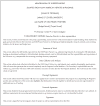Using community-based participatory research as a guiding framework for health disparities research centers
- PMID: 19081761
- PMCID: PMC2600476
- DOI: 10.1353/cpr.2007.0007
Using community-based participatory research as a guiding framework for health disparities research centers
Abstract
There has been growing interest in conducting community-based health research using a participatory approach that involves the active collaboration of academic and community partners to address community-level health concerns. Project EXPORT (Excellence in Partnerships, Outreach, Research, and Training) is a National Center for Minority Health and Health Disparities (NCMHD) initiative focused on understanding and eliminating health disparities for racial and ethnic minorities and medically underserved populations in the United States. The New York University (NYU) Center for the Study of Asian American Health (CSAAH) is 1 of 76 Project EXPORT sites. This paper describes how CSAAH developed partnerships with varied Asian American community stakeholders as a first step in establishing itself as a Project EXPORT center that uses community-based participatory research (CBPR) as its orienting framework. Three guiding principles were followed to develop community-academic partnerships: (1) creating and sustaining multiple partnerships; (2) promoting equity in partnerships; and (3) commitment to action and research. We discuss strategies and action steps taken to put each principle into practice, as well as the successes and challenges we faced in doing so. Developing community-academic partnerships has been essential in our ability to conduct health disparities research in Asian American communities. Approaches and lessons learned from our experience can be applied to other communities conducing health disparities research.
Keywords: Asian Americans; Community-Based Participatory Research; Health disparities; immigrants; minorities.
Figures
References
-
- Israel B, Schulz A, Parker E, Becker A. Review of community-based research: Assessing partnership approaches to improve public health. Annu Rev Public Health. 1998;19:173–202. - PubMed
-
- Minkler M, Wallerstein N, editors. Community based participatory research for health. San Francisco: Jossey-Bass; 2003.
-
- Agency for Healthcare Research and Quality [homepage on the Internet] Rockville, MD: The Agency; [updated July 2002]. Community-Based Participatory Research. Conference Summary. Available from: http://www.ahrq.gov/about/cpcr/cbpr/
Publication types
MeSH terms
Grants and funding
LinkOut - more resources
Full Text Sources
Medical

